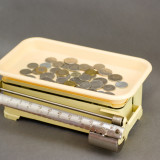Everyone deserves a second chance. That might as well be the marketing slogan for all secured
credit cards, which can help users prove to lenders, banks, credit card issuers and retailers that
they can be responsible with money. But the benefits of secured credit cards – which require
users to put money in the card’s account before they use it, an amount that often serves as the
credit limit – come at a price: their fees and interest rates.
Let’s take a look at what you can expect.
Annual fees and interest rates
The usual cast of characters, including financial behemoths like Visa, offers secured credit cards.
What's normal as far as fees are concerned? Most will have an annual fee, which run in the $29
to $40 range. For instance, USAA, a financial services company that focuses on military
personnel, offers a card for $35 per year, while the similar-sounding US Bank charges anywhere
from $0 to $50. But keep in mind that cards that initially have no annual fee typically begin
levying one after the first year. And other fees, such as an application fee and fees for ATM
usage, apply in the first year. Also be on the lookout for fees charged should you spend more
than your card’s limit as well as for late payments. The list of fees can be quite lengthy; because
of that it is worthwhile to pore over the terms and conditions of any card you’re seriously
considering.
Important Consumer Note!
No Credit/Bad Credit? Click here to build your credit score using a real credit card (not a prepaid or debit card that won't help your credit)!A high credit score can allow you to get a lower rate loan, lower your insurance premiums and may even help you get a job! (sponsor link)
Important Consumer Note!Want to get a prepaid Visa with no monthly fees with direct deposit and with more benefits and features such?
If so, then consider the Go2Bank Cash Rebate Visa- Click Here for More Info and to Apply Online in Just Mins (No Fee with Direct Deposit).
(Sponsor Link)
Another thing to consider with the use of a secured credit card – something that is not an issue
with prepaid debit cards – is interest rates. If you pay your bill on time every month in full,
interest rates don’t affect you. But if you miss a payment, or fall behind, then you need to know
what these three letters – APR, which stand for Annual Percentage Rate – mean in terms of your
money. APR is what the card issuer will charge on your total balance from the minute you are
late on a payment.
In general, interest rates for secured credit cards are higher than for regular, unsecured cards,
although that is not always the case. USAA, for instance, offers a rate of 9.9%, while US Bank
interest rates vary from 16.24% to 22.99%. Then there are cards that offer 0% APR for the first
year you have the card, only to jack up the rate starting on day 366.
There is also the issue of the grace period. With unsecured cards, this period varies from 21 to 25
days, meaning that credit card issuers must notify cardholders of the balance due and provide at
least 21 days to pay the balance. The grace period on secured cards can vary, however, and does
not have to be the minimum 21 days offered on unsecured cards. Some secured cards have no
grace period, which means the interest begins to accrue from the moment you make a purchase,
even if you pay your balance in full and on time. While important, all of this discussion about
late fees and interest rates also highlights another issue. If the very point of getting and using a
secured credit card is to prove your credit worthiness, missing payments and incurring interest
charges isn’t the best way to do it.
How to stay ahead of fees and interest rates
Review your statements and keep an eye on the APR. No one is going to warn you in big, bold
letters that it’s changing. The card issuer might provide a notice with print so small you need a
microscope to read it. But it’s up to you as a consumer to be vigilant.
Be aware of credit line increases. Just because the card issuer increases your credit availability
doesn’t mean you must accept it. If you do, you don’t have to spend it. The elevated credit line
looks good to the credit bureaus that monitor how well you handle credit; spending it and not
paying it back doesn’t.
Shop around. If you don’t like the fees and rates on your current secured card, find another.
Check with credit unions; they are owned and operated by members and not run for profit, which
often translates into lower fees.
Beware of scams offered by so-called credit repair companies. These companies will guarantee a
secured card (an offer of credit is never guaranteed) to clean up your credit history. However, a
secured card does not “clean up” your history; it helps restore your credit worthiness. These
offers also tend to involve a call to a “900” number, which will cost you.
